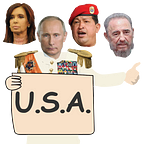The Petrobras probe
As we’ve seen, Brazil’s current president, Dilma Rousseff, was chief of staff in the administration of her immediate predecessor, the beloved Lula. But at the same time she was also head of the state-owned energy company, Petrobras. Operation Car Wash, a probe into Petrobras’s finances, begun in 2014, has investigated several major firms and dozens of politicians — including Rousseff — and has so far uncovered four separate criminal rings. During Rousseff’s second term, which started in January 2015, Petrobras quickly began shaping up into her Watergate.
Even before Rousseff’s re-election, several leading figures had been implicated in Petrobras-related corruption. Already in March 2014, for instance, Paulo Roberto Costa, who’d served as Petrobras’s supplies director from 2004 to 2012, was arrested for his role in the bribery and money-laundering scheme. In September 2014, Costa provided authorities with a list of politicians who’d received bribes. He was later sentenced to 12 years in prison (though he’s since been granted house arrest beginning in October 2016). An August 2015 article reported that a couple of politicians had met with Costa in 2009 in a luxury hotel room in Ipanema, Rio de Janeiro, and handed him a liquor bottle containing $200,000 in cash.
Ricardo Pessoa, owner of UTC, a major construction company, was arrested in November 2014 on charges of bribery and money-laundering, also as part of the Petrobras scandal. In a May 2015 plea-bargain deal, Pessoa acknowledged that he’d handed over large sums to several political campaign, including Lula’s presidential bid in 2006 and Rousseff’s in 2014.
In March 2015, the Supreme Court gave the go-ahead for Petrobras-related probes into dozens of members of Congress; in April evidence was uncovered of “similar scams at Brazil’s health ministry and at state-owned bank Caixa Econômica Federal.” In that same month, a poll found that 63% of Brazilians wanted to see Rousseff impeached.
Also in April, party treasurer João Vaccari Neto was arrested and charged with accepting “irregular donations” to the Workers’ Party from Petrobras suppliers, who were alleged to have inflated contracts with the oil company and funneled excess proceeds to party members and political campaigns.
A former Petrobras manager, Pedro Barusco, who cooperated with prosecutors, testified that he’d personally received almost $100 million in bribes, that he’d met Vaccari at fancy hotels or restaurants to discuss the sharing of bribes, and that some of the ill-gotten cash had been passed on to Rousseff’s 2010 election campaign. Julio Camargo, one of the businessmen charged with bribing Petrobras officials, also provided authorities with details of what he called the “institutionalized reality” of bribery at Petrobras, stating that he himself had paid the firm $4.5 million in bribes.
Vaccari denied everything, as did Rousseff.
Then there’s José Dirceu, a former militant student Communist who’d preceded Rousseff as Lula’s chief of staff, a job from which he resigned after being charged in the 2005 Mensalão scandal (which we’ll get around to later this month). Found guilty in 2012 of corruption, embezzlement, racketeering, and money- laundering, Dirceu was sentenced to seven years in prison, but was apparently released at some point prior to August 2015, when he was arrested on charges of corruption and money-laundering in connection with the Petrobras scandal.
We’re not yet done with Brazil, with Rousseff, or with Petrobras. More on Monday.
